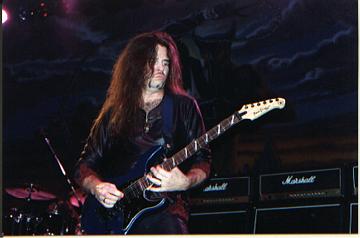FIB MUSIC: I thought Greg Giuffria was out of the loop now.
Craig: He has been. There really hasn't been anything that would inspire him
to do it. But now, it seems like he really wants to do it, but we'll see how it goes.
FIB MUSIC: What else have you been up to?
Craig:
There's a band called Virus I have been working with. Through my program,
there's a band called Benedictum that has been doing really well in Europe...Germany. My program is directly responsible for
them getting signed.
FIB MUSIC: Yeah, I have seen their name around. Who did they sign with?
Craig: Locomotive.
FIB MUSIC: Can you tell us a little more about your program and how it works?
Craig: Yeah. Actually, it started off as a class as the Musician's Institute. The educators
approved it to be part of the bachelor's degree program. But then the college was sold and the new owners did not want to have
any programs under two years old and my program was at about a year and half, so they dumped me. (laughs) So, I started doing it
on my own. While I was at the college, there were kids lined up down the hallway trying to get into the class. This program is
designed to give unknown musicians the equivalency as if they had been in the music industry's top level for twenty years, before
they even start. The reason for that is very, very simple. For one thing there is nowhere to go. These musicians have nowhere
to go to get their careers started. Especially, rock n roll musicians. There are books and there are colleges, but they really
don't teach people how to go from nowhere to getting a major gig with a famous musician, or getting a record deal and getting
worldwide distribution and becoming famous. That's what this program does. I was sleeping in a car on the streets and then five
years later I was headlining Madison Square Garden with my favorite singer, Ronnie James Dio. I teach people how to do that. There
is a thing in the book that shows people how to be unique and how to have your own style....nobody teaches that....this program teaches
them how. I have developed a method that guarantees them 100% if they follow that method, that they will develop their own style and will
become unique. It teaches them what a hit song is made of....what a hit band is made of....I had a hit song with Dio and a hit
song with Giuffria, we had a hit album, hit tour. We were #9 in the MTV top twenty countdown.....gold records, as a songwriter....and I have
met people who have seen shit behind the scenes....it changes how you write songs.
David Coverdale, when he was lead singer for Deep Purple in 1974, they hardly sold a hundred thousand records, but it was
still under the name Deep Purple. It wasn't because he wasn't a good vocalist, or a good songwriter, it's just that he....you know,
the machine, the music industry is a machine and it has a certain type of fuel it runs off of. It took him eleven years on the
learn as you go program that has been in full force, until now. It took him eleven years before he started selling millions of
records with Whitesnake....and it wasn't because he wasn't any good.
FIB MUSIC: Sure and even a few early Whitesnake songs that weren't hits when they were released,
became hits for him after Whitesnake made it big.
Craig: Yeah. A lot of it is, you start meeting managers of other bands and record company
executives and you sit in on meetings. You get to see what program directors and music directors of radio stations and what kind of
criteria they use to get an unknown band on heavy rotation. What a record company thinks is a hit song and what a radio programmer
thinks is a hit song, what the kids thinks is a hit song and what you think is a hit song. But before that, you really only have
what you think is a hit song. Then, when you find out what managers and record company executives and radio
programmers and music
programmers think....when you see the machine first-hand, you start changing the way you write songs and it's not really
compromising, so much as it is, just trying to FIT IN. Then once you fit in, then you become the fuel that the machine needs
to run on and depending on how you design yourself, you can have a successful career. It teaches people what goes on behind
closed doors. The kind of things they need to know, before they start.
FIB MUSIC: The music industry has always had this veil of
secrecy hanging over it and have made it very hard to figure it out.
Craig: Well, a lot of it is the point structure. When a band gets signed they get
anywhere from 7 to 14 points.
FIB MUSIC:
Which is 14%, right?
Craig:
That's right and a lot of it is because the record company puts out a huge investment and is taking the risk, so they want
to make sure they protect their investment. But if the musicians knew what the record companies knew, the power struggle and the point
structure would drastically change in favor of the musician. So, they are not in a hurry to educate people. You know, Michael
Jackson was still on a 14 point deal for awhile, until he started figuring out things and selling records and then eventually like
most people do, they start their own record label. Then the distributor from the major label wants to stay with them, so they
get a subsidiary label together and then they start really making a lot of money and record companies don't dig that shit. Because, they
learn whats going on, so they keep it to themselves. All that information is in the program. It's a highly competitive atmosphere, musicians don't
share information with one another. It automatically makes that person they shared the information with, their competition. So, they
keep all this information to themselves, but they'll smile and shake each others hand, but they won't share
any vital information.....and they could each be holding the piece of the puzzle the other needs, but they won't ever
complete the puzzle, because they
are afraid to create new competition. I get rid of that as well.

FIB MUSIC: And all of this applies to the current state of the record industry?
Craig: Even more so....The record companies are really tightening their belts and with the internet and
everything, they are really being more responsible with their money, so it's even harder if anything.
On top of it all, after they learn all of that. Then I have got producers who have won grammy's, record
company executives on major and independent labels, who have signing power...who will then listen to the material from the
bands or musicians that have purchased my program, with the intent to get them signed.
FIB MUSIC: So, it's a forty dollar investment?
Craig: Forty dollars is for the program and the
two hundred dollars is for the contact program. So, it's like $240.00. Most people spend a thousand or more just to get to the
NAMM show.....,between flight, hotel rooms and making up a bunch of copies of their cd, just so they may bump into someone, who probably won't
even listen to it.
FIB MUSIC: What do you get for the $200.00?
Craig: It gives them a legitimate opportunity to make their dreams
come true; it gives them a place to start. First thing is, there's a thing called unsolicited material, it bypasses all that. That could
be anywhere from five to ten years worth of struggling, completely gone....just trying to make contact. These are all people
waiting to hear their songs. People that are working with me specifically and they are waiting for material. The reason they are
so excited about it; number one, I've known them a long time, but they agree with me, it's about time something changes in the
music industry. Their motivation is, that once they read the book, they thought, "Whoa, I never thought about it that way"...their motivation is that
they think they will be able to pick from the cream of the crop. Because once the musicians read the book, these
guys will know what they're doing. So when they start writing and recording their new material for their demo, they will
submit to us, it's going to be fucking-dead-on-balls-accurate. So, they, the industry contacts, think they are going to gain an
edge against their competition.
FIB MUSIC: Can they buy the book first and then later purchase the contact program?
Craig: Sure, either way. I suggest that people read through it five times to really
soak it all in, because it is twenty years worth of information.....and then write their demo and send it in.....or some
people are already....their music is really right on and just need to make a few changes....they don't have to start all over again.....those people
may want to buy the program all at once. Some people have to start all over again....some people are going to have to be brutally honest
with themselves....does my existing demo really have what it takes?...after reading that book?....and it's not rewriting the songs, we're only
talking about five songs, how hard can it be to write five new songs. Record them in a decent studio, doesn't have to be
state-of-the-art, just as long as it sounds good and represents the band and send with lyrics and pictures and send five copies
of each. These guys that will be listening to the music are heavy hitters.
|

